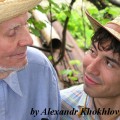David: So, Dad, tell me about the jobs you've had. You've had a lot of jobs in your lifetime. What was your first job that you got?
Richard: My first job was picking beans from a bean patch when I was about ten years of age. It was usually only in the summer months, and I'd make probably a dollar a day. That was it for a couple of months, and that's how I earned enough money to buy my first bicycle. And then when I got a little older, about fifteen years of age, I got job with Elmer's Cannery, the canned vegetables. I ran one of the machines that canned the peas. My job was to make sure the lids were on and sealed by this machine, and I had to keep feeding the machine with lids and cans.
David: How long did you work at the cannery?
Richard: I worked at the cannery for about three years, and it was only during the summer months, usually June, July and August. And then finally, when I reached seventeen years of age, I was able to work for the Canadian Forest Products' Eburn Division, in a huge sawmill located in Marpole. I worked for the pipe fitters. Our job was to install pipes throughout the sawmill that had to do with the sprinkling system which protected the sawmill from fire. The sawmill was completely constructed of huge timbers, and they had sprinkling systems throughout the whole building. Following that, I got a job with the British American Oil Refinery, and I was a lab technician for a year, and I also worked in their power plant for about a year. Then I decided that I didn't like shiftwork, so I decided to go back to University of British Columbia, where I became a teacher. I started teaching when I was twenty-five years of age, and I was teaching, and also, I was a counselor in the high school system.
David: While you were going to university, how many jobs did you have? So, you were working as well as studying. What did you do while you were at university? You worked and you studied at the same time?
Richard: Yes, I was working. What I was doing for part of my training was I was working during the evening as a stationery engineer, which involved running a power plant for a factory that made paper boxes. I'd work until about midnight, and then I'd get up at six o'clock in the morning and head out to the university and work there until about four, then head back to my job in the power plant. I was stretched to the limits. [laughter] David: You also worked at a racetrack, I remember. You told me about this. Explain what you did at the racetrack, because this is something I just have recently learned about you.
Richard: Yes, when I was going to high school, I had the opportunity to work at the Lansdowne Racetrack, located in Richmond. What I was classified as was a "hot walker." I would get up every morning about five o'clock and head over to the racetrack, and when I got there, it would be my job to take the horses one at a time and walk them around a shed row for half an hour, to give them exercise. I could walk three or four horses in an hour, or a hour and a half, and then I would go back home, get ready for school, and then head off to high school.
David: What job do you think prepared you most in life to deal with people, to deal with odd jobs-what job was it?
Richard: I think the one job that had the most influence on my life was working for Canadian Forest Products as a pipe fitter's helper. I just got to work with a lot of men that were much older than myself, and it gave me an education on how to handle myself, and I worked with electricians, pipe fitters, millwrights, and it opened my eyes to so many things in construction-and dealing with everyday problems. It was a great experience for me, and I was treated well, and I enjoyed it immensely.

